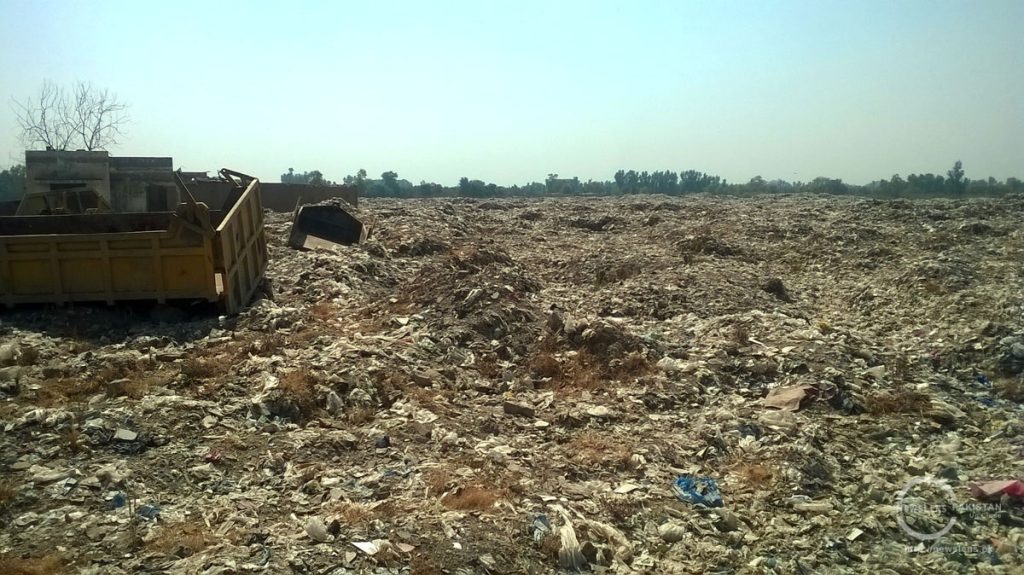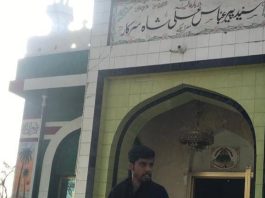
Peshawar: It is hot inside the room where 6 men are working on a machine, feeding polythene resins into the hopper. More than a factory, the place looks like a small house with two rooms, lit up by strong incandescent lights. There are no fans whirring overhead despite the damp, humid August made stickier by the receding monsoons.
The heat from the bulbs and the heating machines makes the strong smell of plastic in the air a noxious, unbearable presence. But the men labour on, their brows shinny with sweat, their clothes drenched in perspiration, oblivious or perhaps immune to the stink of polythene hanging around them.
Among the men here at the polythene bags factory in the Industrial Estate Hayatabad in Peshawar is Asif Khan, the owner of the factory. Khan is in his forties, dressed in plain clothes, lacking the pomp and pride of an industrialist. The impression is reinforced by his dirty hands – he is one of the machine operators here, pulling and shaping the molten poly into plastic bags.
“We are living in Pakistan but want the facilities of England,” said Khan, stopping to mop his brow with his sleeve. Stacks of white polythene bags around the room reflect the light, intensifying the heat. “If the government wants to ban the plastic bags, what cheap alternatives are on offer for people to make a switch to other convenience products? How will the government meet the market demand within two months? It’s impossible to set-up industries of paper bags in two months.”
In an effort to stem environmental pollution and to check the clogging of sewerage system in urban areas that is blamed for the spread of communicable diseases, especially during the rain season, the Khyber Pakhtunkhwa government announced in August to ban manufacturing of polythene bags in the province.
An official release issued by the Chief Minister Parvez Khattak’s Secretariat on August 3, 2015, said, “The ban will be implemented after two months.” During this period, said the release, all stocks of plastic bags would be removed from markets and factories. “Those who continue to use them will be penalized.”
It is not the first time the government has moved to impose the ban on poly bags. Prohibitions in the past that have shown little of no success have turn environmentalists and the public into cynics. Environmentalists advocating ban on plastic bags fear that the decision has been made in “haste”, without doing the necessary homework and would likely end in failure.
“Banning non-degradable plastic materials is not as easy as it looks,” said Dr Muhammad Bashir Khan, Director General of the provincial Environmental Protection Agency (EPA). “Unless we ban plastic shopping bags along with products that also come packaged in plastic bags, the issue will never be resolved.”
While the district administration has been asked to prepare for taking action against plastic bags manufacturers under Section-144 of the Pakistan Penal Code which pertains to ensuring peace and tranquility, the Environment Department and Environmental Protection Agency (EPA) were not informed about the decision to ban poly bags.
In his defense, Peshawar district administration spokesperson Feroz Shah said they had not yet imposed ban on plastic bags; however, they were in consultation with the business community to find an alternative to polythene bags that would facilitate consumers while being environment friendly.
According to a 2010 survey by EPA, the annual average consumption of plastic bags is estimated at 397 bags per person. The report said if the trend continued, the consumption of plastic bag would reach 112 billion in 2015. The report observes that more than 8000 plastic bag production units are operating in different parts of the country, a majority of which are in Lahore (6,000), followed by Karachi (1,200), Peshawar (300) and Faisalabad (230).
The provincial Minister for Environment Fazal Ilahi told News Lens on phone that Chief Minister Parvez Khattak had not discussed the matter of ban on plastic bags with him or any other lawmaker saying only the district administration had been tasked to take measures in this regard.
Nighat Orakzai, the legislator who first brought up the matter of banning the plastic on the assembly floor, was skeptical about the government’s resolve to ban production and usage of plastic bags because there was no “alternative policy” to address the concerns of the business community.
“The government should take traders into confidence before taking such steps,” said Orakzai. “To get rid of this menace, we need a proper ban and not just verbal commitments. A law banning the production of shopping bags must be passed by the assembly in order to succeed on this front once and for all.”
Dr. Shafiq-ur-Rehman, a professor in the Environmental Sciences Department at the University of Peshawar, said plastic had harmful effects on soil, water and air. He said it polluted the environment and adversely affected fertility.
“To control use of plastic is easy and cheap but needs a change in our attitude towards environment and introduction of biodegradable bags,” he told News Lens. “Manufacturers pick plastic bags from garbage and recycle them to make black plastic bags that retain bacteria difficult to destroy, causing health problems.”
He said burning plastic in open space – a common practice among people to dispose trash – creates noxious fumes such as hydrogen cyanide and other poisonous gases that cause air pollution resulting in skin and respiratory problems and cancer.
“Plastic bags do not decay; they just break down into smaller toxic bits polluting soil and waterways and entering the food chain when animals accidentally eat them,” said Dr. Rehman. “A plastic bag made from various toxic chemicals can take between 400 to 1000 years to break down in the environment. In Khyber Pakhtunkhwa, it has badly affected the aquatic life in rivers.”
He said that people thought paper bags were a good alternative to plastic bags but they were not. “They are energy intensive and unless made from recycled paper products, they result in cutting of trees from which paper is made.”
Several attempts have been made in the past to ban plastic bags, but to little avail. In 1997 the PML-N government in the province, led by chief minister Sardar Mehtab Ahmed Khan, had initiated efforts to put an end to the use of plastic bags.
The lawmakers had even prepared a legislation and moved it in the assembly to be turned into a law. However, the move fizzled out after manufacturers of polythene bags and plastic products moved the Peshawar High Court against the government’s decision.
Dr. Rehman referred to the Sindh High Court ruling in 1996 to form a commission to ban plastic material, including plastic shopping bags, that was struck down by the Islamabad Law Division because the commission would have affected the entire plastic industry.
He said in 2003, the mayor of Peshawar city, Ghulam Ali, imposed a ban on the use of black plastic shopping bags but that too fizzled out in time.
Shahid Ali, an industrialist, said banning plastic was a great step but plastic was a cheap and affordable technology. “It only requires a small room to install machinery used in manufacturing plastic bags.”
He said a majority of plastic industries in the city were not registered with the government. Convenience stores in the province had earlier experimented with discontinuing use of plastic bags, he said, but most people, especially those living below the poverty line, were “quantity orientated not quality.”
President Khyber Pakhtunkhwa Chamber of Commerce and Industries, Faud Ishaq, said the business community was in favour of ban on use and production of polythene bags.
He suggested that the government offer interest-free loans to help manufacturers convert their existing plants to produce biodegradable shopping bags.
“About 200,000 people are directly and 600,000 people indirectly associated with the plastic shopping bag business,” he said.
Asif Khan, the polythene bag manufacturer, claimed that stocks worth billion of rupees was present in the markets of Peshawar alone. “There are a number of plastic bags industries in Punjab and the Federally Administered Tribal Areas (FATA),” he said.”It is not possible for the provincial government to stop production of polythene bags there. Besides, plastic bags manufactured in Iran are also available in the local market, brought in illegally from Afghanistan to FATA and onward to Khyber Pakhtunkhwa.”



